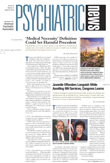It's déjà vu all over again. Ten years after a debate on national health system reform sputtered and died, a group calling itself the largest coalition of organizations focused on health care reform has issued an alarm: the nation's health care system is in crisis and needs immediate, fundamental, systemic reform.
The National Coalition on Health Care (NCHC), a Washington, D.C.–based advocacy group, issued a report calling for fundamental health system reform beyond anything that is being considered today in Congress.
“Small, incremental changes are not sufficient,” said NCHC President Henry E. Simmons, M.D., M.P.H., in a statement accompanying the report. “Our health care system is literally in crisis. We need reforms that are ambitious, comprehensive, and systemwide.
“We need these reforms now,” he continued. “We cannot wait any longer. The status quo is not working. It leaves tens of millions of Americans with no insurance at all. It allows costs to skyrocket year after year. And it jeopardizes the safety of patients because of widespread substandard care.”
The organization's report sounded the familiar alarm about the rising numbers of uninsured and rising costs to employers, and issued the familiar call for use of technology to improve efficiency and stream-line administrative costs.
And it added one complaint that was not around 10 years ago, prior to the Institute of Medicine's report on quality of care: that many Americans who are insured are receiving substandard care.
The report outlined “a range of options” for achieving universal coverage without recommending any one. These include employer mandates, expansion of existing public programs, creation of new programs targeted at subsets of the uninsured, and establishment of a universal, publicly financed program.
The report stated that legislation incorporating any of these options should include adequate subsidies for those who are less affluent, assure continuity of coverage for those who move from one form or context of coverage to another, facilitate enrollment by all those eligible for coverage, and require individuals to document that they have health insurance coverage.
While the report defined a core benefit package in the broadest terms, it did not include mention of substance abuse and mental illness.
“Coverage should encompass medically necessary, comprehensive care, including emergency care, acute care, prescription drugs, early detection and screening, preventive care, care for chronic conditions, and end-of-life care,” the report stated. “Pre-existing conditions should not be excluded from coverage. The details of the core benefit package, within each of the categories noted, should be consistent with best medical practices and should be adjusted over time, as science and technology advance and as the understanding of best practices evolves.”
As familiar and ambitiously general as many of its points are, the NCHC report is noteworthy because of the size and diversity of the organization's membership, the bipartisan composition of its leadership, and the stridency of its call for immediate action.
The organization includes large and small employers, unions, religious organizations, AARP, and a number of medical organizations. The latter include the American Academy of Family Physicians, American Academy of Pediatrics, and American College of Physicians–American Society of Internal Medicine.
Earlier this year, the APA Board of Trustees endorsed its own policy statement on universal access to health care coverage. The statement says that it is APA policy “to support universal access to health care, specifically including nondiscriminatory coverage of treatment for mental illness, including substance abuse, for all Americans. APA will advocate vigorously for this at local, state, and national levels.”
The NCHC report appears to be a sign that momentum is building toward another urgent national debate on health system reform, 10 years after that urgency dissipated in the wake of the failure of the Clinton health reform initiative.
In a press conference announcing the release of the report, former Iowa governor Bob Ray, a co-chair of the coalition report, underscored the gravity of the nation's health care ills.
“Delay is not a viable option,” said Ray, a Republican.“ This system will not self-correct. Systemwide reform will require bipartisan support. The changes that are needed will not be made and will not succeed if we allow health care to be a partisan, political bouncing ball.
“For reform to happen, all of us will have to give a little,” he added. “If each of us—each political leader, each organization, each voter—holds out for our own ideal, we'll remain deadlocked and stymied. The crisis in health care will deepen.”
The report, “Building a Better Health Care System: Specifications for Reform,” is posted online at<www.nchc.org/materials/studies/reform.pdf>.▪
